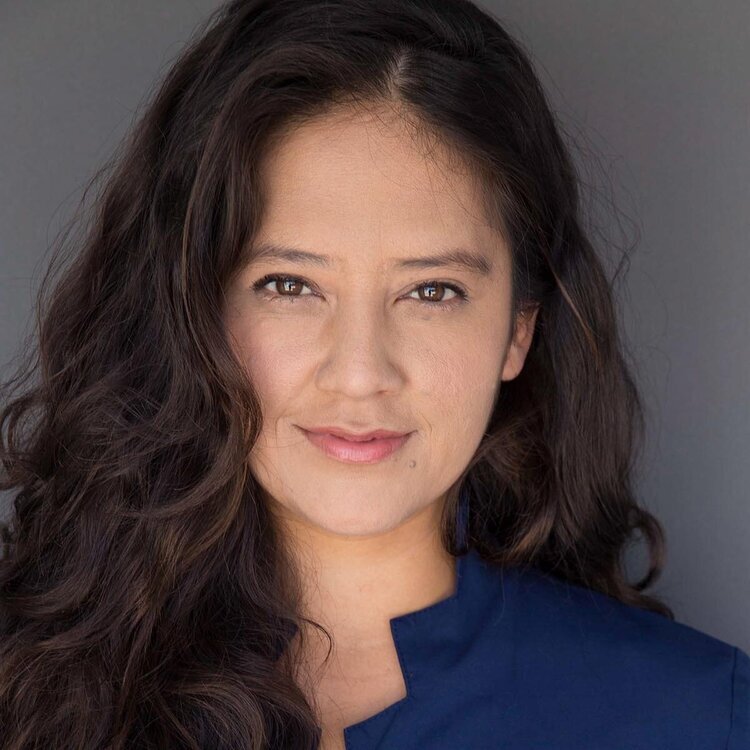We Build
Photojournalist Zaydee Sanchez during an assignment for California Newsroom in Big Bear, California in August 2022. Photo by Caleigh Wells
To get things done, we inspire one another to persevere
Editor’s note: An original version of this essay written by photojournalist Zaydee Sanchez, a contributor to palabra, ran in the magazine of the National Press Photographers Association (NPPA) with this note to celebrate Hispanic Heritage Month which runs from Sept. 15 to Oct. 15: “Sanchez offers personal perspectives on getting started in photojournalism and what inspires her. Her most recent story, which was published in High Country News,"The Pride and Pain of the UFW March," documented California farmworkers and their advocates as they walked 335 miles to California's state capitol in support of voting protections. The story was supported by the Economic Hardship Reporting Project.”
We added additional photos from Sanchez’s work featured at palabra.
At first, I thought photojournalism was what I believed to be: a luxurious, selfish, unachievable career. A luxury, considering it requires thousands of dollars invested in equipment such as body cameras, lenses, lights, and also travel expenses, and so much more. Selfish, because I am born of Mexican immigrant parents who grew up on tortilla con sal, three meals a day and became factory and farmworkers in the U.S. The weight of any first-generation child to bring wealth into the family is immeasurable. And I felt it was unachievable, as I was unaware of any “successful” Latina photojournalist at that time.
With that perspective, I can understand the hesitation mis hermanas latinas might feel when aspiring to work in this industry. But today, I thoroughly understand our value and the critical necessity of having Latina storytellers, including LGBTQ storytellers. I have concluded that no demographic can fully represent our communities if it isn’t us. No amount of gringos learning Spanish can fully capture the authenticity and culture of our communities. Our complete selves, with all of our different backgrounds and upbringings, hold the unteachable force of being Latinx.
Photo above and below from the story, “Unheard, Overlooked and Exposed,” that features the struggles of farmworkers to receive healthcare services during the pandemic. Early in the morning, Silvia García develops a rhythm to quickly and most efficiently pick each grape branch before temperatures reach the high 90’s. Photo by Zaydee Sanchez for palabra
Silvia García’s newborn daughter, Geraldine, was born during the COVID-19 pandemic. García recalls her fear of giving birth at the hospital without her husband or family able to be there because of COVID restrictions. Photo by Zaydee Sanchez for palabra
Growing up in California’s San Joaquin Valley exposed me to issues that, as a child, I did not comprehend. These same issues have shaped my career. I began working as a freelance photojournalist in 2018, documenting the U.S.-Mexico border. I quickly realized the issue of migration went beyond people seeking asylum. I began asking more questions. The more questions I asked, the more my work changed, and the more I leaned into my background and owned who I am. I realized the narratives that were being told and who was telling them. I expanded my interest outside of the southern border and looked into the immigration issues I grew up on. I sought out answers abroad from countries such as Mexico, Honduras, and Guatemala to better understand the people I was documenting. I focused on underreported narratives about farmworkers, gender, and environmental racism, which led me back to the San Joaquin Valley. I leaned into my community, understanding how vital our Latinx photographers are. We hold a responsibility to our communities to provide truthful, ethical, empowering stories. No one can master what we do.
Above and below, Sanchez spent almost two years documenting the experiences of Leonor Gomez, a wife fighting to stop her husband’s deportation and to prove his innocence from crimes he allegedly committed in the ‘80s in Guatemala. “A Clash of Two Lives.” In the photo, Gomez embraces her daughter Debbie on the second day of a hunger strike outside the immigration service office in downtown Los Angeles. October 3, 2020. Photo by Zaydee Sanchez for palabra
As Debbie preaches to the congregation, Leonor closes her eyes in prayer. Throughout her husband’s detention, Leonor says her faith has kept her going. July 10, 2022. Photo by Zaydee Sanchez for palabra
We cannot do it alone. This industry is tough, I can never deny that. But this industry is also filled with beautiful people who uplift each other. Individuals who understand we are more powerful united. We should take out the word “competition” from our photojournalism vocabulary. When you see for the first time an NPPA Puerto Rican woman president reaching out to Latina photojournalists saying, “I see you” with just a gaze, your soul could never compete with her.
This is how we get things done. We inspire each other to persevere. We hold each other accountable and push each other beyond our beliefs. We build. We build to the top editing jobs, to directors and founders of publications, and we bring our raza with us. It is achievable, we can be successful, and we do have examples today to whom we can aspire. Like NPPA’s president Marie D. De Jesús and outlets such as this one.
We will change this industry mano a mano. We build with confidence because we have always been worthy.
Zaydee Sanchez is a Mexican American visual storyteller, documentary photographer, and writer from Tulare, California, in the San Joaquin Valley. She seeks to highlight underreported communities and overlooked narratives, with a focus on labor, gender, and displacement. Zaydee is an International Women's Media Foundation grantee and a 2021 USC Annenberg Center for Health Journalism Fellow. Her work has been published in Al Jazeera, National Geographic, NPR, among others. She lives in Los Angeles. Follow her on Instagram: @zaydee.s







